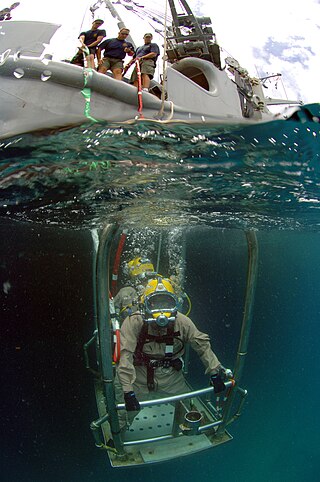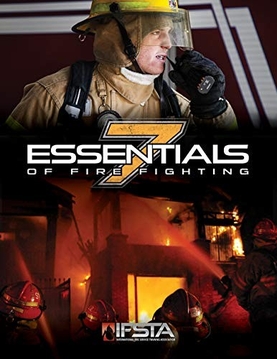Admiralty law or maritime law is a body of law that governs nautical issues and private maritime disputes. Admiralty law consists of both domestic law on maritime activities, and private international law governing the relationships between private parties operating or using ocean-going ships. While each legal jurisdiction usually has its own legislation governing maritime matters, the international nature of the topic and the need for uniformity has, since 1900, led to considerable international maritime law developments, including numerous multilateral treaties.

A firefighter is a first responder trained in firefighting, primarily to control and extinguish fires that threaten life and property, as well as to rescue persons from confinement or dangerous situations. Male firefighters are sometimes referred to as firemen.

Diving activities are the things people do while diving underwater. People may dive for various reasons, both personal and professional. While a newly qualified recreational diver may dive purely for the experience of diving, most divers have some additional reason for being underwater. Recreational diving is purely for enjoyment and has several specialisations and technical disciplines to provide more scope for varied activities for which specialist training can be offered, such as cave diving, wreck diving, ice diving and deep diving. Several underwater sports are available for exercise and competition.
Underwater divers may be employed in any branch of an armed force, including the navy, army, marines, air force and coast guard. Scope of operations includes: search and recovery, search and rescue, hydrographic survey, explosive ordnance disposal, demolition, underwater engineering, salvage, ships husbandry, reconnaissance, infiltration, sabotage, counterifiltration, underwater combat and security.

Piper Alpha was an oil platform located in the North Sea about 120 miles (190 km) north-east of Aberdeen, Scotland. It was operated by Occidental Petroleum (Caledonia) Limited (OPCAL) and began production in December 1976, initially as an oil-only platform, but later converted to add gas production.

Firefighting is a profession aimed at controlling and extinguishing fire. A person who engages in firefighting is known as a firefighter or fireman. Firefighters typically undergo a high degree of technical training. This involves structural firefighting and wildland firefighting. Specialized training includes aircraft firefighting, shipboard firefighting, aerial firefighting, maritime firefighting, and proximity firefighting.

USS Springfield (SSN-761), a Los Angeles-class submarine, is the fourth ship of the United States Navy to bear the name. The boat was named in honor of both the cities of Springfield, Illinois and Springfield, Massachusetts.

The Croatian Navy is the naval force branch of the Croatian Armed Forces. It was formed in 1991 from what Croatian forces managed to capture from the Yugoslav Navy during the breakup of Yugoslavia and Croatian War of Independence. In addition to mobile coastal missile launchers, today it operates 30 vessels, divided into the Navy Flotilla for traditional naval duties, and the Croatian Coast Guard. Five missile boats form the Croatian fleet's main offensive capability.

Marine salvage is the process of recovering a ship and its cargo after a shipwreck or other maritime casualty. Salvage may encompass towing, lifting a vessel, or effecting repairs to a ship. Salvors are normally paid for their efforts. However, protecting the coastal environment from oil spillages or other contaminants from a modern ship can also be a motivator, as oil, cargo, and other pollutants can easily leak from a wreck and in these instances, governments or authorities may organise the salvage.

Underwater diving, as a human activity, is the practice of descending below the water's surface to interact with the environment. It is also often referred to as diving, an ambiguous term with several possible meanings, depending on context. Immersion in water and exposure to high ambient pressure have physiological effects that limit the depths and duration possible in ambient pressure diving. Humans are not physiologically and anatomically well-adapted to the environmental conditions of diving, and various equipment has been developed to extend the depth and duration of human dives, and allow different types of work to be done.

Essentials of Fire Fighting is a fire service training manual produced by Fire Protection Publications (FPP) and the International Fire Service Training Association (IFSTA). Fire Protection Publications is a department of Oklahoma State University College of Engineering, Architecture, and Technology (CEAT) in Stillwater, Oklahoma. This manual is used by fire service training agencies and departments around the world to train personnel to become firefighters. The Essentials of Fire Fighting is the required training manual used in countless local fire departments and state/provincial training agencies in every region of the United States and Canada. Since the release of the first edition of this manual in 1978, more than 2.5 million copies of the Essentials of Fire Fighting have been distributed to the fire service.
Salvage logging is the practice of logging trees in forest areas that have been damaged by wildfire, flood, severe wind, disease, insect infestation, or other natural disturbance in order to recover economic value that would otherwise be lost.

Salvage diving is the diving work associated with the recovery of all or part of ships, their cargoes, aircraft, and other vehicles and structures which have sunk or fallen into water. In the case of ships it may also refer to repair work done to make an abandoned or distressed but still floating vessel more suitable for towing or propulsion under its own power. The recreational/technical activity known as wreck diving is generally not considered salvage work, though some recovery of artifacts may be done by recreational divers.

Material handling involves short-distance movement within the confines of a building or between a building and a transportation vehicle. It uses a wide range of manual, semi-automated, and automated equipment and includes consideration of the protection, storage, and control of materials throughout their manufacturing, warehousing, distribution, consumption, and disposal. Material handling can be used to create time and place utility through the handling, storage, and control of waste, as distinct from manufacturing, which creates form utility by changing the shape, form, and makeup of material.

Underwater search and recovery is the process of locating and recovering underwater objects, often by divers, but also by the use of submersibles, remotely operated vehicles and electronic equipment on surface vessels.

Collections management involves the development, storage, and preservation of cultural property, as well as objects of contemporary culture in museums, libraries, archives and private collections. The primary goal of collections management is to meet the needs of the individual collector or collecting institution's mission statement, while also ensuring the long-term safety and sustainability of the cultural objects within the collector's care. Collections management, which consists primarily of the administrative responsibilities associated with collection development, is closely related to collections care, which is the physical preservation of cultural heritage. The professionals most influenced by collections management include collection managers, registrars, and archivists.

Disaster preparedness in museums, galleries, libraries, archives and private collections, involves any actions taken to plan for, prevent, respond or recover from natural disasters and other events that can cause damage or loss to cultural property. 'Disasters' in this context may include large-scale natural events such as earthquakes, flooding or bushfire, as well as human-caused events such as theft and vandalism. Increasingly, anthropogenic climate change is a factor in cultural heritage disaster planning, due to rising sea levels, changes in rainfall patterns, warming average temperatures, and more frequent extreme weather events.

The U.S. Navy Diving Manual is a book used by the US Navy for diver training and diving operations.

The 'ten agents of deterioration' are a conceptual framework developed by the Canadian Conservation Institute (CCI) used to categorise the major causes of change, loss or damage to cultural heritage objects. Also referred to as the 'agents of change', the framework was first developed in the late 1980s and early 1990s. The defined agents reflect and systematise the main chemical and physical deterioration pathways to which most physical material is subject. They are a major influence on the applied practice of conservation, restoration, and collection management, finding particular use in risk management for cultural heritage collections.















